Papers by Anna Kwiatkowska

Journal of Happiness Studies
How can one conclude that well-being is higher in country A than country B, when well-being is be... more How can one conclude that well-being is higher in country A than country B, when well-being is being measured according to the way people in country A think about well-being? We address this issue by proposing a new culturally sensitive method to comparing societal levels of well-being. We support our reasoning with data on life satisfaction and interdependent happiness focusing on individual and family, collected mostly from students, across forty-nine countries. We demonstrate that the relative idealization of the two types of well-being varies across cultural contexts and are associated with culturally different models of selfhood. Furthermore, we show that rankings of societal well-being based on life satisfaction tend to underestimate the contribution from interdependent happiness. We introduce a new culturally sensitive method for calculating societal well-being, and examine its construct validity by testing for associations with the experience of emotions and with individuali...
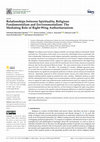
International Journal of Environmental Research and Public Health
According to past research, religious attitudes can strongly influence individuals’ beliefs and b... more According to past research, religious attitudes can strongly influence individuals’ beliefs and behaviors. The purpose of this study was to assess the relationships between spirituality (the Scale of Spirituality; dimensions include religious spirituality, expanding consciousness, searching for meaning, sensitivity to art, doing good, and sensitivity to inner beauty), religious fundamentalism (the Religious Fundamentalism Scale), support for right-wing authoritarianism (the Right-Wing Authoritarianism Scale), climate concerns (the Environmental Concern Scale), and pro-environmental behavior (the Pro-Environmental Behavior Scale). The cross-sectional study involved 512 Poles aged 18–63 (M = 34.63, SD = 5.96; Mdn = 33), including 51% females. Multiple regression analysis revealed that two dimensions of spirituality (sensitivity to art and doing good) and religious fundamentalism are significant and opposite predictors of climate concern and pro-environmental behavior. Spirituality app...
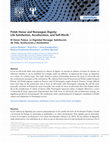
Locus of self-worth shifts from internal in cultures of dignity to external in cultures of honor.... more Locus of self-worth shifts from internal in cultures of dignity to external in cultures of honor. It remains yet unknown whether it can be modified, for example, under an influence of important life events, as migration to a culture of a distinct logic. Our study aimed to analyse relationships between the locus of self-worth and the acculturation strategies on life satisfaction. We collected data from 60 heterosexual Polish couples living in Poland, 120 Polish migrant couples in Norway, and 60 Norwegian couples living in Norway. Groups differed from each other in life satisfaction and in locus of self-worth, with Norwegians valuating the self the most internally and Poles in Poland the most externally. Our results on locus of self-worth show that Polish culture fits in the classification of culture of honor, while Norwegians represent culture of dignity. Moreover, a series of hierarchical linear regressions demonstrated that both locus of self-worth and acculturation strategy are si...
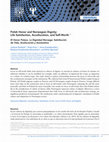
Acta de Investigación Psicológica, 2019
Locus of self-worth shifts from internal in cultures of dignity to external in cultures of honor.... more Locus of self-worth shifts from internal in cultures of dignity to external in cultures of honor. It remains yet unknown whether it can be modified, for example, under an influence of important life events, as migration to a culture of a distinct logic. Our study aimed to analyse relationships between the locus of self-worth and the acculturation strategies on life satisfaction. We collected data from 60 heterosexual Polish couples living in Poland, 120 Polish migrant couples in Norway, and 60 Norwegian couples living in Norway. Groups differed from each other in life satisfaction and in locus of self-worth, with Norwegians valuating the self the most internally and Poles in Poland the most externally. Our results on locus of self-worth show that Polish culture fits in the classification of culture of honor, while Norwegians represent culture of dignity. Moreover, a series of hierarchical linear regressions demonstrated that both locus of self-worth and acculturation strategy are si...
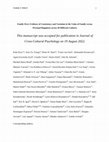
Journal of Cross-Cultural Psychology
People care about their own well-being and about the well-being of their families. It is currentl... more People care about their own well-being and about the well-being of their families. It is currently, however, unknown how much people tend to value their own versus their family’s well-being. A recent study documented that people value family happiness over personal happiness across four cultures. In this study, we sought to replicate this finding across a larger sample size ( N = 12,819) and a greater number of countries ( N = 49). We found that the strength of the idealization of family over personal happiness preference was small (average Cohen’s ds = .20, range −.02 to.48), but present in 98% of the studied countries, with statistical significance in 73% to 75%, and variance across countries <2%. We also found that the size of this effect did vary somewhat across cultural contexts. In Latin American cultures highest on relational mobility, the idealization of family over personal happiness was very small (average Cohen’s ds for Latin America = .15 and .18), while in Confucian ...

Men Disability Society, 2016
The purpose of the study was to examine how people with physical disabilities perceived themselve... more The purpose of the study was to examine how people with physical disabilities perceived themselves and whether their self-image contained social stereotypes of people with disabilities. The sample consisted of 16 respondents (13 women) with various physical disabilities of different severity. It was an exploratory study carried out within the qualitative paradigm (open questions, interviews). The semi-structured interview was based on questions related to self-esteem, body image, capabilities, breakthrough moments in life, perception by others, others’ reactions to disability and strategies used to cope with those reactions. Also, parts of the Social Perception Questionnaire (Jarymowicz, 1994) were used. The interviewees focused mainly on the positive aspects of self-perception and it could seem that their self-image did not contain stereotypes and that they did not experience discrimination from society. However, detailed analyses showed that disability stereotypes and personal exp...
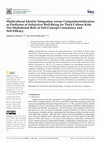
International Journal of Environmental Research and Public Health
Globalization has resulted in an exponential increase in the number of Third Culture Kids (TCKs),... more Globalization has resulted in an exponential increase in the number of Third Culture Kids (TCKs), defined as being raised in a culture other than that of their parents (or the passport country) and meaningfully interacting with different cultures. Inconsistencies regarding the effect of multicultural and transient experiences on well-being exist in the psychological literature. We aimed to reveal associations between multicultural identity configurations (integration, categorization, compartmentalization) and well-being with the mediating role of self-concept consistency and self-efficacy. Participants (n = 399, M = 21.2 years) were students at an international university in the United Arab Emirates. We used the Multicultural Identity Integration Scale, the Berne Questionnaire of Subjective Well-Being, the General Self-Efficacy Scale, and the Self-Consistency Subscale from the Self-Construal Scale. The findings suggest that not merely exposure to diversity but also internal integrat...

International Journal of Intercultural Relations, 2021
Abstract The 21 st century, defined by cultural diversity and global mobility, has triggered an u... more Abstract The 21 st century, defined by cultural diversity and global mobility, has triggered an unprecedented increase in multicultural individuals, defined as people who internalised more than one culture. Contrasting evidence related to multiculturalism calls for more explorative research to understand cross-cultural identities. The present study explored social and cultural identities of adult female Third Culture Kids (TCKs) (n = 122), multicultural individuals who live mobile lives, and adjustment factors of a global mindset, social inclusiveness and essentialism to find predictors of life satisfaction. We classified social identity into four we-concepts: we-group, we-category, we-attributive and we-axiological, and cultural identity into three configurations: integration, categorisation and compartmentalisation. Our results suggested that TCK define social identity predominantly based on passport country (we-category) and relationships with family and friends (we-group). We indicated that axiological (value-based) social identification and global mindset buffered essentialism and categorisation known to disturb cross-cultural relationships. There was a general tendency for integrated cultural identity, with cultural configurations of categorisation and compartmentalisation correlating positively with essentialism. Hierarchical regression analysis evidenced that integrated multicultural identity, global mindset, and social inclusiveness were significant positive predictors of life satisfaction for female TCK. These results feed into a better understanding of the TCK configurations of collective identities and highlighted new factors related to TCK well-being.
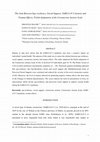
Reports to date have shown that the SARS-CoV-2 pandemic may have a negative impact on individuals... more Reports to date have shown that the SARS-CoV-2 pandemic may have a negative impact on individuals’ mental health. The purpose of this study was to assess the relation between ego-resiliency, social support, coronavirus anxiety and trauma effects. The study employed the Polish adaptation of the Coronavirus Anxiety Scale (CAS). It involved 515 individuals aged 18–78. The Polish version of CAS revealed satisfactory psychometric properties (α = .86). Structural equation modelling indicated that ego-resiliency (the Ego-Resiliency Scale) and social support (the Multidimensional Scale of Perceived Social Support) were correlated and reduced the severity of the novel coronavirus anxiety (CAS). Moreover, the level of anxiety allowed for predicting negative trauma effects (the short form of the Changes in Outlook Questionnaire). The scores indicate the need for practitioners to focus on interventions which elevate ego-resiliency and perceived social support to improve mental health during the...
The Journal of Positive Psychology, 2021

International Journal of Stress Management, 2017
Family and work are two important areas of adult life. However, these two domains are not always ... more Family and work are two important areas of adult life. However, these two domains are not always compatible, and the degree to which these roles are at conflict influences numerous spheres of individuals’ and couples’ lives. Work-life conflict is especially evident among migrants, as the separation from social networks within the home country makes the migrant couples’ lives harder. This article explores the hypothesis that the means of coping with work-life conflict and resultant stress differ between migrant couples and couples living in their home country. In our study conducted among 120 migrant couples (Poles in Norway) and 120 home-country couples (60 Polish couples in Poland and 60 Norwegian couples in Norway), we document that (a) organizational support efficiently minimizes work-life conflict of couples living in their home country (both in Poland and in Norway), whereas (b) migrant couples tackle their work-life conflict on their own.

This chapter examines how the use of abstract language can reinforce sexist stereotypes about gen... more This chapter examines how the use of abstract language can reinforce sexist stereotypes about gender and domestic violence against women. To set the stage, the chapter shows how gendered stereotypes operate in Polish society, using indicative examples from the coverage of domestic violence cases in the print media. These examples are analyzed in relation to Polish research on gender stereotypes including a discussion of the scope (and limits) of the influence stereotypes can exert on assessments of gender and domestic violence. This discussion is then expanded to include a different line of social psychological research concerned with the relationship between stereotyping and the level of abstractness of the words used to characterize persons and events. This latter research suggests that the kind of generalizations made in stereotypical statements—and the falsehoods and biases these often imply—can be conveyed in subtle ways without using blatantly obvious stereotypical remarks. Ho...

The aim of the study was to analyze the influence of cultural factors (collectivistic and individ... more The aim of the study was to analyze the influence of cultural factors (collectivistic and individualistic orientation) and sex (perceiver, victim and perptrator) on perception of conflicts in close relationships (perception of victim and perpetrator). Data were collected in three countries: Poland (N=157), France (N=153) and Spain (N=66). There were 183 female and 193 male participants. The Singelis et al. (1995) scale was used in order to measure collectivism and individualism; dependent measures of likelihood of helping a victim and disapproval of a perpetrator's behavior were measured with the Personal Relationships questionnaire consisted of 10 stories describing conflicts between partners in intimate relationships (in half of stories the perpetrator was male, in half – female). Results revealed a generally higher disapproval when the perpetrator was male and victim – female. There was a tendency of the respondents to declare more help to male than to female victims, which c...

Recent Research in Psychology, 1990
Two basic dimensions are proposed to underlie the sense of personal identity. The first refers to... more Two basic dimensions are proposed to underlie the sense of personal identity. The first refers to a dimension of personal continuity from the past into the future, the second to a dimension of distinctiveness from others. In the present study it is hypothesized that the onset of children’s formal education (i.e., the entrance to the elementary school) and the resulting new social experiences will challenge the children’s personal identity. The continuity of the self and the individual uniqueness are threatened during this period because of changes in children’s social status, that is, changes from the status of children treated individually within family settings to the status of pupil or member of a peer-group. These experiences are thought to affect the sense of self-esteem of the children. In total 102 children participated in this study. They were divided into two age groups with mean ages 6.0 years (n=51; 27 boys and 24 girls) for the preschool, and 8-years (n=51; 26 girls and 25 boys) for the elementary school children. All children were presented with a semi-structured interview to assess their general feelings of sameness over time and their ideas about similarities with and distinctiveness from others. In addition, particular features of the self underlying these feelings were identified. A five-point scale was used to assess children’s evaluation of themselves, that is, self-esteem. The results indicate that (a) elementary school children manifest a lower self-esteem than preschool children; (b) the number of children who did not notice changes of themselves over time decreases with age; (c) elementary school children perceive more frequently than preschool children changes as well as continuity (i.e., sameness) of the self; (d) with the elementary school children the distinctiveness from others decreases, while the sense of similarity with others increases; (e) the perceived sense of continuity and distinctiveness is based on different personality traits with the preschool and elementary school children, and (f) elementary school children think about themselves in psychological terms more often than preschool children, whose self-descriptions are foremost based on appearance.
Framing Sexual and Domestic Violence through Language

Journal of Happiness Studies, 2020
Numerous studies document that societal happiness is correlated with individualism, but the natur... more Numerous studies document that societal happiness is correlated with individualism, but the nature of this phenomenon remains understudied. In the current paper, we address this gap and test the reasoning that individualism correlates with societal happiness because the most common measure of societal happiness (i.e., country-level aggregates of personal life satisfaction) is individualism-themed. With the data collected from 13,009 participants across fifty countries, we compare associations of four types of happiness (out of which three are more collectivism-themed than personal life satisfaction) with two different measures of individualism. We replicated previous findings by demonstrating that societal happiness measured as country-level aggregate of personal life satisfaction is correlated with individualism. Importantly though, we also found that the country-level aggregates of the collectivism-themed measures of happiness do not tend to be significantly correlated with indivi...







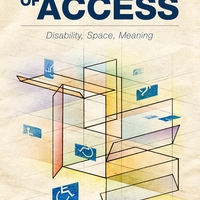



Uploads
Papers by Anna Kwiatkowska